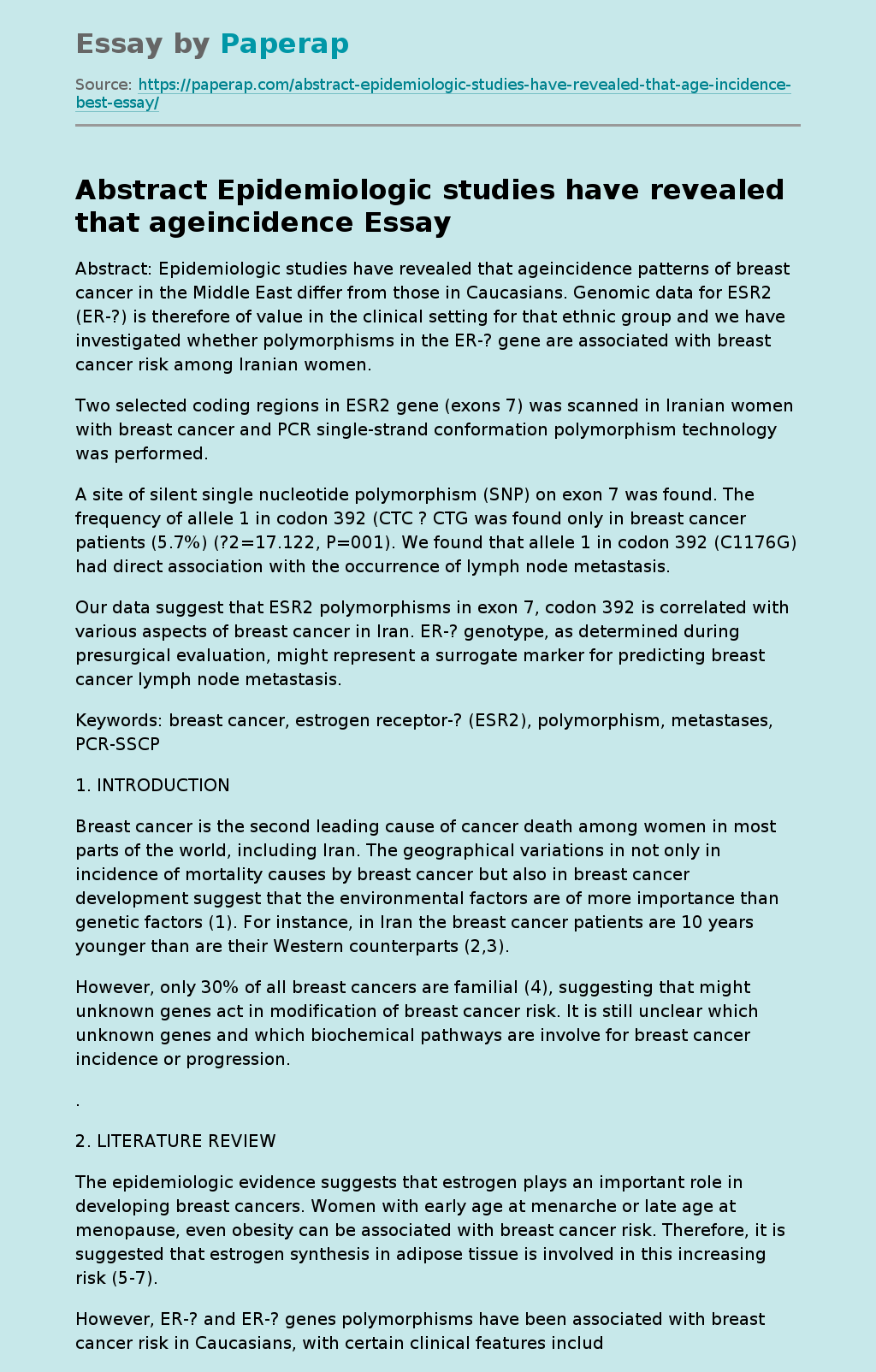Abstract Epidemiologic studies have revealed that ageincidence
Abstract: Epidemiologic studies have revealed that ageincidence patterns of breast cancer in the Middle East differ from those in Caucasians. Genomic data for ESR2 (ER-?) is therefore of value in the clinical setting for that ethnic group and we have investigated whether polymorphisms in the ER-? gene are associated with breast cancer risk among Iranian women.
Two selected coding regions in ESR2 gene (exons 7) was scanned in Iranian women with breast cancer and PCR single-strand conformation polymorphism technology was performed.
A site of silent single nucleotide polymorphism (SNP) on exon 7 was found. The frequency of allele 1 in codon 392 (CTC ? CTG was found only in breast cancer patients (5.7%) (?2=17.122, P=001). We found that allele 1 in codon 392 (C1176G) had direct association with the occurrence of lymph node metastasis.
Our data suggest that ESR2 polymorphisms in exon 7, codon 392 is correlated with various aspects of breast cancer in Iran. ER-? genotype, as determined during presurgical evaluation, might represent a surrogate marker for predicting breast cancer lymph node metastasis.
Keywords: breast cancer, estrogen receptor-? (ESR2), polymorphism, metastases, PCR-SSCP
1. INTRODUCTION
Breast cancer is the second leading cause of cancer death among women in most parts of the world, including Iran. The geographical variations in not only in incidence of mortality causes by breast cancer but also in breast cancer development suggest that the environmental factors are of more importance than genetic factors (1). For instance, in Iran the breast cancer patients are 10 years younger than are their Western counterparts (2,3).
However, only 30% of all breast cancers are familial (4), suggesting that might unknown genes act in modification of breast cancer risk.
It is still unclear which unknown genes and which biochemical pathways are involve for breast cancer incidence or progression.
.
2. LITERATURE REVIEW
The epidemiologic evidence suggests that estrogen plays an important role in developing breast cancers. Women with early age at menarche or late age at menopause, even obesity can be associated with breast cancer risk. Therefore, it is suggested that estrogen synthesis in adipose tissue is involved in this increasing risk (5-7).
However, ER-? and ER-? genes polymorphisms have been associated with breast cancer risk in Caucasians, with certain clinical features including presence of a family history (8) and lymph node (LN) metastasis (8-12). At the present the literature provide a little information regarding ESR2 gene expression, mutational frequency, and allelic variants in breast cancer. Thus, in this study we tried to identify gene variants in selected region of exon 7 in estrogen receptor ? gene (ESR2), and its association with breast cancer risk in order to establish for the first time in Iran as Asian-Caucasian genome, and to test any correlation between gene polymorphism and clinical features of breast cancer in Iranian women.
3. METHODS AND MATERIALS
Study population
A case-control study was conducted from April 2004 to January 2008 in Tehran, Iran. The breast cancer patients (n =150; median age 47.49 ± 11.43 years) were newly diagnosed and mostly living in Tehran. They were entered into the study if they had a confirmed pathological breast cancer diagnosis at the Imam Khomeini Hospital Complex (a large teaching and general hospital in the central district of Tehran) and were referred to our several clinics of the Cancer Institute, including Women Sections 1 and 3, and Central Clinics of 1 and 2 for breast surgery. The control group (n =147; median age 40.75± 10.54 years) included healthy women neither with any history of breast cancer nor any other neoplastic diseases, and also none of their relatives had a history of breast cancer. Women with hysterectomy and artificial menopause or exposed to any kind of radiation and chemotherapy in their life time were excluded from the study. By the permission from
Abstract Epidemiologic studies have revealed that ageincidence. (2019, Dec 10). Retrieved from https://paperap.com/abstract-epidemiologic-studies-have-revealed-that-age-incidence-best-essay/

